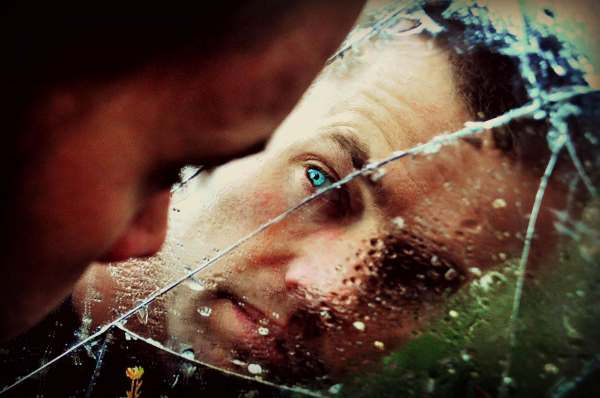Fake True Love by Unrealistic Romantic Culture
- Aug 23, 2025
- 5 min read
Updated: Nov 30, 2025

The Lie You Were Raised On
You were taught that love completes you.
That somewhere out there is “the one” — the missing piece, the perfect match, the person who will make everything make sense.
You saw it in movies.
"He runs through the airport.
She cries in the rain.
They kiss, and the world dissolves."
You heard it in songs.
“I can’t live if living is without you.”
“You complete me.”
“I found my other half.”
And so you believed it.
You believed that love is the answer.
That without it, you’re unfinished.
That with it, you’re whole.
But this is not love.
It’s mythology.
And it’s keeping you emotionally dependent, romantically disillusioned, and spiritually fragmented. This article will unlock these misleading concepts of romantic relationships from psychological and reality perspectives.
The Cultural Myth of “The One”

Romantic culture sells you the idea of “the one".
”The soulmate.
The twin flame.
The person who will heal your wounds and make you whole.
But this myth is dangerous.
It makes you:
Tolerate red flags because “love is hard”
Stay in toxic dynamics because “they’re my person”
Abandon yourself to preserve the fantasy
It turns love into salvation.
And the other person into a god.
But no one is your missing piece.
And love is not a rescue mission.
The Psychology of Fusion
Erich Fromm warned us decades ago:
Most people don’t seek love.
They seek fusion — the emotional merging that promises relief from existential loneliness.
Fusion feels intoxicating.
You lose yourself in the other.
You feel seen, wanted, chosen.
You feel like you finally belong.
But Fromm called this immature love — love rooted in need, not freedom. He wrote:
“Mature love says: ‘I need you because I love you.’
"Immature love says: ‘I love you because I need you.’ ”
When you chase completion through another person, you’re not loving them. You’re using them to fill a void. And that void cannot be filled externally.
Jung’s Warning: Projection Is Not Intimacy

Carl Jung taught that romantic attraction is often projection — the unconscious act of assigning our inner traits, desires, and wounds onto another person.
You don’t fall in love with them.
You fall in love with what they reflect.
Your buried softness.
Your unclaimed sensuality.
Your forgotten joy.
Jung believed that the anima and animus — the archetypal feminine and masculine energies — live within each of us.
When we meet someone who activates these energies, we project our ideal onto them.
They become the fantasy.
The savior.
The mirror.
But projection is not intimacy.
It’s illusion.
And when the illusion breaks, so does the relationship.
The Neuroscience of Romantic Idealization

Neuropsychology shows that romantic love activates the brain’s reward system — flooding it with dopamine, oxytocin, and serotonin.
This creates a chemical high.
You feel euphoric, validated, alive.
But this high isn’t sustainable.
It’s designed for bonding — not completion.
When the chemicals fade, you’re left with the reality:
They’re not perfect.
They don’t complete you.
They can’t fix what’s broken inside.
And if your love was built on the fantasy of completion, the crash feels like betrayal.
Not because they changed — but because the illusion collapsed.
The Cost of Completion Fantasy
When you believe love completes you, you stop developing the parts of yourself that feel incomplete.
You outsource your emotional growth.
You depend on someone else’s presence to feel whole.
This creates:
Emotional dependency
Identity fusion
Chronic anxiety about abandonment
You become addicted to their attention.
You panic when they pull away.
You collapse when they leave.
Because they weren’t just a partner — they were your emotional scaffolding.
And when they’re gone, the structure falls.
Love Is Not a Cure for Loneliness
Loneliness is not a sign that you need someone.
It’s a signal that you’ve disconnected from yourself.
Fromm believed that modern society breeds loneliness through disconnection — from nature, from community, from self. And we try to cure it with romantic obsession.
But love cannot fix existential isolation.
It can only illuminate it.
Real love doesn’t erase loneliness.
It holds space for it.
It invites you to meet yourself in the silence.
What Real Love Looks Like

Real love doesn’t complete you.
It expands you.
It doesn’t erase your wounds.
It holds them with compassion.
It doesn’t fuse identities.
It honors individuality.
Fromm described mature love as a union that preserves integrity.
Two people standing side by side — not collapsing into each other, but growing together.
Real love is not a transaction.
It’s not a performance.
It’s not a cure.
It’s a mirror that reflects your growth.
A container that holds your truth.
A space where your wholeness is not threatened — but celebrated.
Real love says:
“I see you, and I don’t need you to be anything but yourself.”
“I choose you, not to complete me — but to walk beside me.”
“I love you, and I will not abandon myself to keep you.”
This is not romantic fantasy.
It’s emotional maturity.
And it’s the only kind of love that lasts.
The Path to Wholeness
Wholeness is not a destination.
It’s a process — one that requires radical honesty, emotional integration, and psychological courage.
Jung called this process individuation: the journey of becoming who you truly are by integrating all parts of the psyche — the conscious, the unconscious, the shadow, the persona, the archetypes.
Individuation is not self-improvement.
It’s self-reclamation.
It asks:
What parts of me have I disowned to be loved?
What emotions have I suppressed to be accepted?
What truths have I silenced to be chosen?
It requires you to confront the masks you wear.
To dismantle the fantasies you’ve built.
To reclaim the voice you abandoned.
Wholeness is not perfection.
It’s integration.
It’s saying:
“I am not missing anything.”
“I am not waiting to be completed.”
“I am already whole — even in my brokenness.”
This is the foundation of emotional sovereignty. And it’s the only way to love without losing yourself.
A Pathway Helps You Be Whole
The 30-Day to Authentic Love & Emotional Liberation Program is not about fixing you. It’s about helping you remember who you are beneath the conditioning, the projections, and the romantic myths.
Each day is a guided step into your psyche — combining Jungian theory, somatic practices, emotional regulation, and deep reflection.
You’ll learn to:
Identify and withdraw projections
Reclaim your shadow traits
Regulate your nervous system
Rewire emotional dependency
Rebuild your boundaries and voice
Reconnect with your inner archetypes
Release the fantasy of completion
Cultivate love from wholeness, not hunger
This is not a surface-level course.
It’s a psychological initiation.
A return to your emotional center.
By the end of the 30 days, you won’t just understand your patterns — you’ll have the tools to transform them.
You’ll stop chasing love.
And start becoming it.



Comments